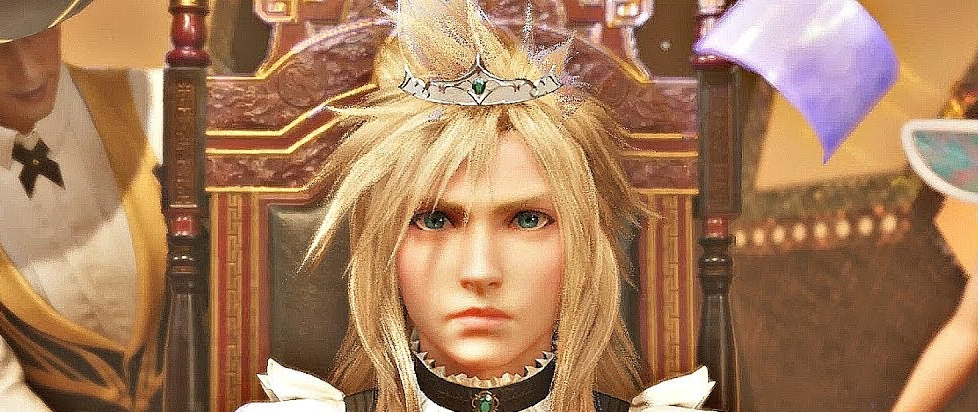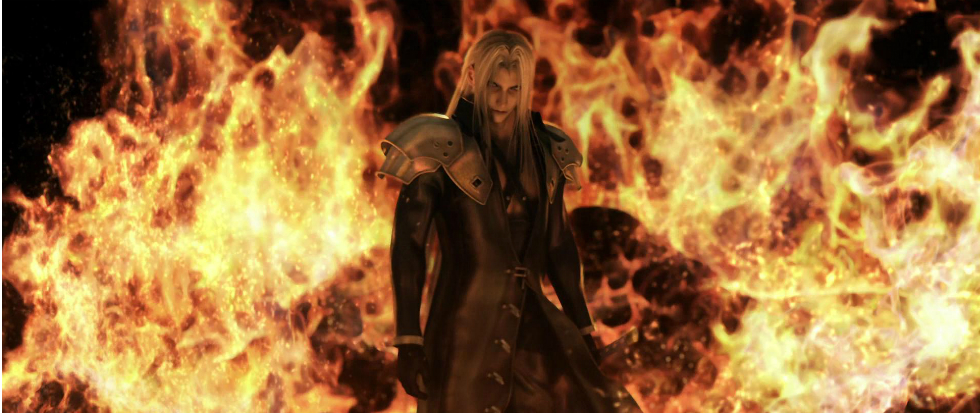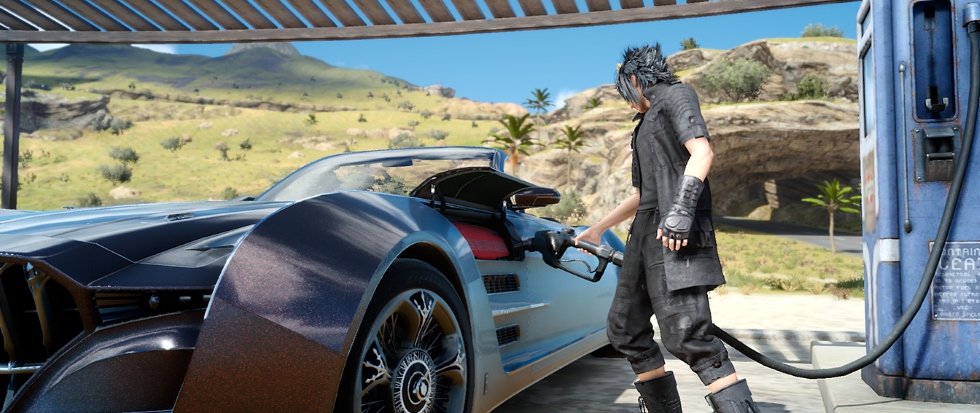
Wall Market Isn’t Burning
As confetti dances through the air above the main stage of the Honeybee Inn, men covered head to toe in suits and vests twirl alongside women in strapless leotards and semi-opaque tights. The music crescendos and Andrea Rhodea tells Cloud “don’t ever be afraid,” as “true beauty is an expression of the heart. A thing to which notions of gender don’t apply.” Cloud continues to give Andrea, the audience of the Inn and the player the same blank expression he’s been wearing since the moment he was pulled onto the stage and thrust into a performance grasping at queer expression to which he never consented. The dress, the hair extensions, Andrea’s words; these are all inconveniences for Cloud to tolerate, to endure. His walk to Don Corneo’s in full princess illusion might as well be a walk of shame.
Terms such as homophobia and transphobia are more often used to convey a hatred of any and all things homosexual or transgender than they are to express fear. However, fear is literally the emotion at work as the suffix “phobia” betrays the root from which that hatred grows. Though hatred and fear can overlap, Final Fantasy VII Remake’s presentation of the Honeybee Inn sequence conveys an anxious hesitation rather than outward malice. I do not know the hearts of Tetsuya Nomura or any of the directors and developers of Remake. However, the work they’ve produced reflects a queerphobic anxiety in modernizing the Honeybee Inn sequence to avoid “the physical unease” brought on by the original Final Fantasy VII’s predatory caricatures and use of trans panic while not being so progressive as to unnerve the cisgender, heterosexual customer whose dollar Square Enix desires.
Cloud can inexplicably know Andrea’s choreography and twirl onstage with him, but his expression must be kept neutral, because to smile would mean Cloud enjoys dancing with a man. He can wear a tiara, lip gloss and hair extensions, but he can not be allowed even a glance at himself, much less marvel at his own beauty. To do so would mean Cloud is able to find enjoyment wearing “women’s clothes.” Andrea can look upon Cloud’s glamour and say, “Honey…I’m in love,” but his masculinity must be later reaffirmed in a pull-up minigame. Andrea’s declaration of the queer expression “to which notions of gender don’t apply” must be worded to allow plausible deniability for any cishet player whom might be uncomfortable at the sight of a man expressing admiration for another man’s looks. Depending on how comfortable the player is with queerness, his words may be read as those of a queer theorist or apolitical aesthete.
However, this sequence isn’t one constructed only with potentially queerphobic players in mind, as a key figure is planted in the audience to hoot and holler at Cloud’s dance and forced foray into crossdressing: Aerith. Like a straight woman at a drag show for her bachelorette party, Aerith has the time of her life watching Cloud twirl and get up in the gig. Her placement in this scene serves a couple of functions: one, to encourage cishet players to cheer along and two, express to queer players how far the franchise has come in Queer Representation. She isn’t laughing at Cloud, she’s cheering for him. This isn’t a joke, it’s a celebration! It would be one thing if Cloud expressed any desire to take part in even a single aspect of this performance and Aerith was encouraging him with her cheers. Instead, her applauding as he appears to let his mind escape elsewhere as he goes through the motions of the dance and lets himself be pushed into the makeover chair come off as insensitive at best, mocking at worst.
Unfortunately, an Aerith who encourages a Cloud who may want to dance with Andrea or, god forbid, try on a dress and loosen up out of the stoicism he’s adopted after years of trauma in SOLDIER may run the risk of normalizing these ideas. This is a AAA game meant for consumers to buy worldwide. Cloud cracking a smile while he dances is too radical. Presenting queerness is allowed, otherwise the Honeybee Inn and Andrea would’ve been cut from the game entirely. Representing queerness by allowing Cloud the room to explore his gender presentation or even his relationship to gender roles within his cisgender is a step too far for Remake.
This practice of inching one foot forward while leaving the other firmly in place with regards to queer representation is not new to gaming. Consider internationally successful franchises such as The Sims in which every sim is pansexual, but the terms “pansexuality,” “bisexuality,” or any other marker of identity are found nowhere in the games. In Fire Emblem: Three Houses, players have a small handful of options for same-sex partnership (especially if your player character is female, as male Byleth only gets two options, one of them requiring paid DLC), yet the dialogue is the same for each pairing regardless of gender, ignoring the marked differences in the lived experiences of queer people. This year’s Persona 5: Royal updated the dialogue of a couple scenes featuring predatory queer caricatures so that instead of sexually preying on Ryuji they, get this, force him into drag without his consent. No blonde twink is safe from a pair of #301’s and chiffon. Even this makeover is done offscreen and these changes were made only for the English localization, so the Japanese edition of Royal kept it’s homophobic portrayals untouched.
The thread connecting these examples is fear. Whether it’s a fear through erasing terminology or an anxiety to appear too forward thinking while not being so progressive as to lose cishet dollars, these practices are rooted in homophobia and transphobia. Again, I do not know the hearts of the people who make any of these decisions, be they design, marketing, or storytelling. What I do know is that as a queer player, I’m tired of feeling my face go as blank and numb as Cloud’s as I consume the safest possible excuses for queer representation and expression in video games. I’m tired of spending yet another Pride Month thinking about the ways AAA gaming regularly fails their queer players while appropriating their rainbows in pursuit of queer dollars. I’m tired of measuring progress in vague lines about beauty and the cheers of a straight woman. In ironing out the wrinkles of the original Final Fantasy VII’s queerphobic scenes, the developers of Remake flattened any potential for queer substance in the sequence. They’ve modernized the presentation, but come up short in meaningful representation.
Trevor Richardson is a critic who loves manga, video games, and matcha. They can be found tweeting about their current obsessions, latest writing, and queer fury @brisuuve.





